December 22, 2017
Air Date: December 22, 2017
FULL SHOW
SEGMENTS
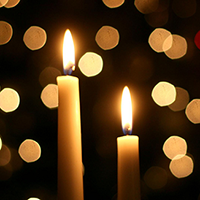
Christmas Candles
/ Jay O'CallahanView the page for this story
Master storyteller Jay O’Callahan joins host Steve Curwood to share some tales about his family during the holiday season. O’Callahan recalls his community’s tradition of Christmas caroling and how it brought hope to his mother in a time of darkness and for Christmases to come. (07:15)

Mary’s New Year’s Eve
/ Jay O'CallahanView the page for this story
Jay O’Callahan sat down with host Steve Curwood and shared some tales about his family and how an imaginative young girl creates her own special celebration as the guest of honor at a very exclusive party. (04:00)
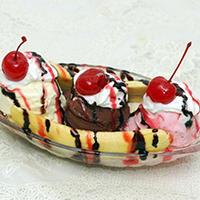
Superbowl Sundae
/ Jay O'CallahanView the page for this story
For many children, some vital grown-up rituals can be very tedious. So, as storyteller Jay O’Callahan shares with host Steve Curwood, the imaginative youngster Mary creates her own unusual but delicious version of Superbowl Sunday, with sundae toppings. (06:40)
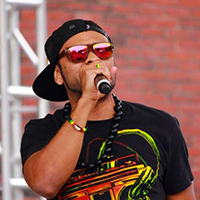
A Green Message for the Next Generation
/ Tem BlessedView the page for this story
Tem Blessed, an environmentally and socially-conscious hiphop artist, sat down with host Steve Curwood to discuss how contemporary music can communicate the importance of the environment and sustainability to young audiences. He illustrates this with two of his own pieces: “I am the bee” and “Now is the time.” (09:30)
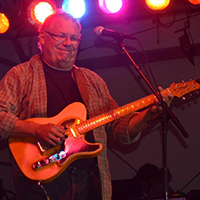
A Mainer's Family Traditions
/ Denny BreauView the page for this story
Denny Breau, a singer/songwriter from Maine, joins host Steve Curwood during these cold winter months to discuss some of the moments that warm his heart. He shares stories about one of his favorite holiday meals, ice-fishing, his Acadian family origins, and traditions of song that span the generations. (21:00)
Show Credits and Funders
Show Transcript
HOST: Steve Curwood
GUESTS: Jay O'Callahan, Tem Blessed, Denny Breau
[ACOUSTIC GUITAR MUSIC]
CURWOOD: From Public Radio International, this is Living on Earth. I'm Steve Curwood. We have some special music today because we're taking a break from news of environmental troubles and triumphs to just celebrate life, as people take time at home for the holidays. So this is our winter solstice and holiday time show of storytelling and music.
[ACOUSTIC GUITAR MUSIC]
O'CALLAHAN: When I was a little boy, Christmas Eve was very special. My sisters and I would run halfway across the street, and we'd turn and look at our house. It was a big old house and it would be dark, but there would be a lit candle in every window. But then came the Christmas Eve when everything was different.
CURWOOD: We're celebrating the season with stories and music on Living on Earth. Stick around.
[NEWSBREAK MUSIC: Boards Of Canada “Zoetrope” from “In A Beautiful Place Out In The Country” (Warp Records 2000)]
Christmas Candles
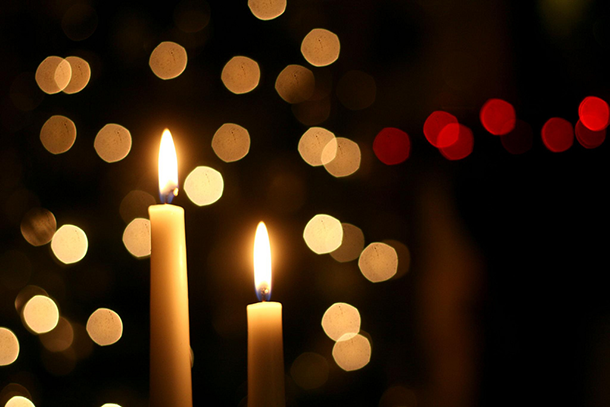
On Christmas, the windows in Jay O’Callahan’s childhood home were each dressed with a white candle—a sign of hope and peace for the season and the New Year. (Photo: Anne; Flickr CC BY-NC-SA 2.0)
CURWOOD: From the University of Massachusetts Boston and PRI, this is an encore edition of Living on Earth. I’m Steve Curwood. This time of year, when the sun is lowest in the northern sky and the days are short, we take a break from the often urgent pace of environmental news and information to celebrate life with some stories and songs, as folks gather together with friends and family. So make yourself comfortable. Maybe throw another log on the fire, or perhaps get out of the passing lane, and get ready to share performances with us, starting with a true journey to hope and fulfillment with master storyteller Jay O'Callahan.
[MUSIC]
CURWOOD: Jay tours nationally, bringing his stories to a wide variety of audiences, but he’s no stranger to Living on Earth, and we're delighted to have him back to celebrate the holiday season. Great to see you, Jay.
O'CALLAHAN: It's wonderful to be back.
CURWOOD: Our theme is “Home For the Holidays,” and, Jay, you have a personal story about home and family when you were growing up and you and your sisters went caroling.
O'CALLAHAN: Yes, Steve, it's called "Christmas Candles", and here's the story.
When I was a little boy, Christmas Eve was very special. My sisters and I would run down the outside back stairs. It would be dark and cold. We'd run halfway across the street, and we would turn and look at our house. It was a big old house and it would be dark, but there would be a lit candle in every window. My sister Maureen would do it with my dad, and Maureen never forgot things. It would take our breath away.
Then we'd run across the street to the Graham's and Dr. Graham would take us Christmas caroling. Maybe 12 or 14 neighborhood kids. We'd go all over the neighborhood. Dr. Graham was the director of the Faulkner Hospital in Jamaica Plain -- that's in Boston -- and he would work seven days a week, but -- a few days before Christmas Eve, he would come home early. He would gather us all in the living room to conduct us. Music was very important to him. He would bend over and conduct with his hands and his eyes and we would sing [SINGS QUIETLY] Venite adoremus. Then he would stand up a little straighter [SINGS A LITTLE LOUDER] Venite... Then he’d stand all the way up [SINGS LOUDLY] Venite adoremus. We felt very important.
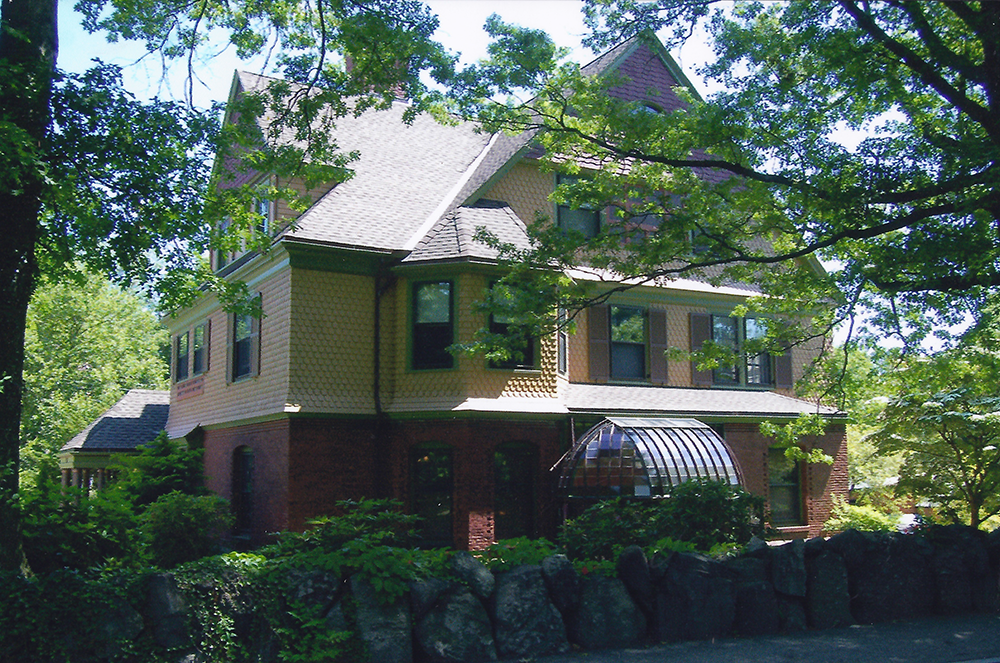
Jay O’Callahan’s boyhood home in Brookline, MA, described in his “Christmas Candles” story. On Christmas Eve, the house would be entirely dark, except for one white candle in each window. (Photo: Bill Kennedy)
But then came the Christmas Eve when everything was different. My mother, usually full of energy, she was tired that day and she was pale. Three days before she’d given birth to my brother Christopher. Christopher! I had three sisters and now a brother, Christopher. He had this big name, “Christopher.” I had this little name, “Jay,” but he was Christopher. I could imagine Christopher coming home wearing his diapers carrying the car. "Christopher's home!"
But Christopher didn't come home. Something was wrong, maybe it was his heart. So mother was worried all that Christmas Eve day. Daddy was out shopping with Uncle Neal, which meant he might come home festive. Later in the day there was a phone call. Mother picked it up, and the doctor said, "Your baby is dying. There's nothing we can do," and he hung up. It was so abrupt.
Daddy came home and he was furious. He called, got the doctor and said, "Listen. That is no way to tell anyone their child is dying. We’ll be right down there."
So we went down to the hospital. We were on the third floor. We went all the way down. It was this glassed-in area. We could see these little babies, and one of the babies was turning blue. It was Christopher. Another doctor came over and said to Dad, "There is a new procedure. We replace the blood. We'll know in a few days."
So we went home, not knowing whether Christopher was going to live or die. Dad helped mother up our wide front stairs into the room. He came out of the room. It was dark, and he saw us in the hallway, and he said, "There's nothing you can do. Just hope for the best. Go Christmas caroling."
So we ran down the outside back stairs, ran halfway across the street and turned. We were so disappointed. All the electric lights were on. Even Maureen had forgot to light the white candles. And Dr. Graham took us all over the neighborhood. He always knew who was hurt and sad and lonely. We would go to the Free Hospital For Women. We would do the Christmas caroling in the big ward, and the whole thing took two hours. So that night we came back over the hill towards our house, and we all stopped and looked at our big old house. It was all dark, but there was a lit white candle in every window. And Dr. Graham said, “We're going to sing one more carol, for your mother.”
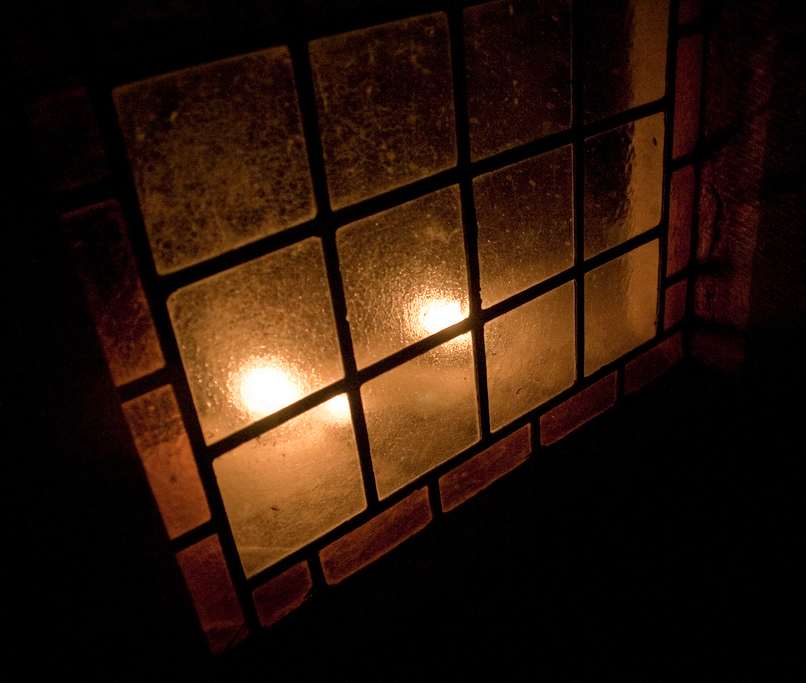
Candles flickered in the O’Callahan’s windows as the carolers sang outside. (Photo: chrisdonia; Flickr CC BY-NC-SA 2.0)
And we did something we'd never done before. We walked around behind the house and we were singing up towards mother's window on the second-floor. The window was all black, but there was that white candle. We were singing “The First Noel.” He was conducting us, and then mother appeared in the window wearing a white house coat. She looked like an angel.
Ten years later we were finishing up the Christmas caroling, and Dr. Graham said, "One more carol." It was a tradition now. We always sang up to mother's window. So we were singing, and as we were singing…I had my college sweater on... Singing “The First Noel,” mother appeared as she always did and then I looked...My sister was beside me, Maureen, and she was crying. And I thought, "Oh, she's just been married. She's going off to Chicago." And then I realized she was crying because she was standing beside Christopher. He was 10 years old.
CURWOOD: You got me with that one, Jay.
O'CALLAHAN: Good.
CURWOOD: I just got that catch in my throat. So your brother lived.
O'CALLAHAN: My brother lived. He loves to hear that story only because of that moment. If they had not replaced the blood, he would've died. And it was just a new procedure at the time. So he was something like negative, but it was only that other doctor who happened to hear and come over.
CURWOOD: So he's your family's Christmas present all these years.
O'CALLAHAN: Yes it's true. I told that at Thanksgiving, and Christopher said, "Good ending!"
[MUSIC]
Related link:
More about Storyteller Jay O’Callahan
Mary’s New Year’s Eve

Many people around the world ring in the New Year with fireworks celebrations surrounded by family and friends. In Mary’s vivid imagination, she is the guest of honor at an exclusive dance soirée. (Photo: Christopher Chan; Flickr CC BY-NC-ND 2.0)
CURWOOD: [LAUGHS] Jay O'Callahan, storyteller, is with us this holiday special, and you have a story about Mary. Now, as I understand it, she's an imaginative, really highly creative girl, and she uses that creativity to make sense of the world that grown-ups present to her.
O'CALLAHAN: Yes, Steve, and these stories were made up when my daughter was seven and eight and nine. If my son was asleep she would get Mary stories. If she was asleep, my son would get Willie stories. And I think that the stories try to reflect my daughter's own playfulness and imagination and making sense of the world when you're seven and eight and nine. Whenever there was an event like New Year's Eve or some special holiday, she would want a Mary story about that, and that's how this story came along.
CURWOOD: Well, since New Year's Eve is coming, Jay, tell us how Mary figured in how to ring in the new year.
O'CALLAHAN: Mary was eight years old. She lived in New York City. She loved the color red. Her uncle and aunt would give her a red belt, red socks, a red hat. Her mother designed dresses. Her mother would show Mary a design, and she'd say, "I know, Mary, it’s good but not enough red. Is that right?" and she would say, "Yes." Mary was the only one on the bus who hoped the bus would have to stop for a red light.
Her mother said a few days before New Year's, "Mary, why don't you stay up until midnight, to toast the new year in with your father and I."
"Oh no. I'm going to a party."
"You are?"
"Yes, I'm the guest of honor."
Nothing more was said.
New Year's Eve, Mary dressed up in her red dress, black bow, black belt. She had supper with her parents. It was almost 9 o'clock, and her mother said, "Only three more hours."
"Oh no, I have to go. Good night."
Kissed her parents goodbye, ran down the hall, opened a door, stepped into her room, put on the light and the guests said, "Welcome, Mary!"
Mary went right to her table, and she turned the clock the ahead almost three hours so it looked like two minutes to midnight. Then she looked at the guests, 60 guests, all made of toothpicks in little clay bases. 30 of the guests had black crêpe paper. They were the men dancers. 30 of the guests had red crêpe paper. They were the women dancers.
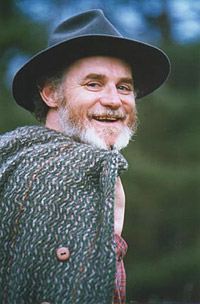
Storyteller Jay O’Callahan. (Photo: Jim Mahoney)
Then she got the fan, turned it on, and the fan rotated back and forth so the dancers leaned back [SHHH, SHHH] and sprang forward [SHHH, SHHH] and back on the table. She put the needle on the old-fashioned record her grandmother had given her with the New Year's music. [SINGS MELODY OF AULD LANG SYNE.]
"Hurry, Mary," the guests said, "Hurry, Mary!"
She ran over to the corner where she had a dollhouse and she had a tiny glass with just one drop of cherry soda. She lifted the glass and she said, "Happy New Year!"
"You're the best, Mary!"
"Oh, no..."
"Yes, you're the best."
"I suppose..."
The real New Year's came, and her parents came down to check on Mary. They opened the door. The light was on. Mary was sound asleep in the bed with her red dress. The fan was going on, and the dancers [SHHH-SHHH] going back and forth. And the needle was on the end of the record going [TICK, TICK]. Her father took the needle off, shut the victrola off, and her mother covered Mary. The two of them toasted their daughter, then they left to turn the light out, but they left the fan on so the dancers could dance the New Year in [SHHH-SHHH-SHHH-SHHH].
CURWOOD: Well, Mary has a great world, doesn't she?
O'CALLAHAN: [LAUGHS] She does. Imagination can do anything.
CURWOOD: So, she understands what's important about the New Year, and then I guess a few weeks later she is challenged by another tradition. This time, it's the Super Bowl.
O'CALLAHAN: Yes.
[WIND WHISTLING]
CURWOOD: We'll be back in a few moments with more about Mary from storyteller Jay O'Callahan. Stay tuned to Living on Earth.
Related link:
More about Storyteller Jay O’Callahan
[MUSIC]
ANNOUNCER: Support for Living on Earth comes from the Gordon and Betty Moore Foundation, and from a friend of Sailors for the Sea, working with boaters to restore ocean health.
[CUTAWAY MUSIC: Modern Mandolin Quartet, Russian Dance, “Trepak”, arr. M. Imholz and P. Binkley, orig. comp. Pyotr Ilyich Tchaikovsky in The Nutcracker Suite, Op. 71a (Sono Luminus 2011)]
Superbowl Sundae
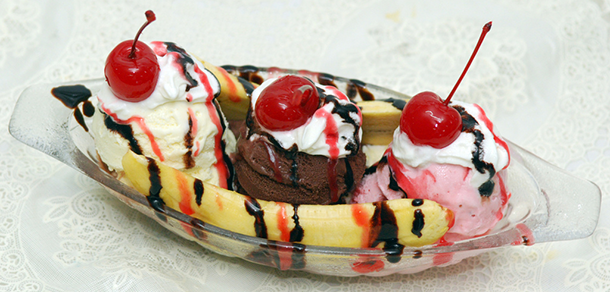
Mary used banana and maraschino cherry ice cream toppings as football players in her own version of a “Superbowl Sundae.” (Photo: pancit tinola; Flickr CC BY 2.0)
CURWOOD: It's an encore Living on Earth holiday season show. I'm Steve Curwood. We're back with Jay O'Callahan for more about Mary. This one takes us further into the New Year. For Mary, a certain pro-sports event turns into an opportunity to play her own game. So Jay, what is the story?
O'CALLAHAN: Steve, this Mary story is called "Super Bowl Sundae.”
Mary, eight-years-old, lives in New York, loves the color red. Sunday evening, she'll say to her dad, "Let's play checkers," and she would have the red checkers. Or they would go walking, and her dad would say, "Look at that dog on the red leash," and she might say, "Look at that nose on that red face". She loves the color red. So one Sunday evening she ran in the living room, "All right, Dad, let's play checkers!"
"Oh no, no, no, Mary, this is Superbowl Sunday."
"What's that?"
"Oh, this is the best football game of the year. I've been waiting all year for this, Mary. On the table, Mary, I've got everything you want there, cheese, sandwiches, pickles. Now, look at the television."
She looked at the television, and it showed thousands of people in the stadium, and then it showed the football players: the two teams facing one another. The two teams bent down and then they fell on the ground. Boring. But they got up, they faced one another, they got down, they fell on the ground.
"Daddy, this is boring."
"No, defense is the name of the game. Defense is the name of the game, Mary. Now watch this."
So boring. She went into the kitchen, opened the refrigerator and, ah, there was a jar of red cherries. Her mother called them “maraschino” cherries. So she took the jar out and she poured the juice into a cup. She had an idea. She would have her own Super Bowl. She had a pewter tray, and she put 23 teeny, little maraschino cherries on the end of the tray. It was going to be maraschinos against the bananas. She got the bananas. She cut slices two inches high. 23 bananas, two inches high, they were on the other end. Now it was going to be maraschinos against the bananas. Now, she needed a stadium, so she got the popcorn going, "Pop. Pop. Pop. Pop. Pop. Pop. Pop. Pop." She filled seven, big bowls with popcorn, and the popping kept going on. "Pop. Pop. Pop. Pop. Pop. Pop." Now, she needed a referee so she had an olive that was the referee. Last thing she needed was the kitchen timer. She put it at three minutes. That was plenty. And now, the Super Bowl was beginning. She lifted up the tray and the teeny little maraschino cherries started down towards the huge bananas. The maraschinos, they were all stopped except for one teeny maraschino who slipped through the bananas and scored. Mary was so excited that she twisted the tray, and the maraschino who scored fell onto the floor, and she stepped on him. Uh-oh! She picked him up. She was the ambulance. [SIREN] She went down to where her mother kept the needle and thread, and then she went back to the kitchen. [SIREN] Now she had to operate on poor maraschino.
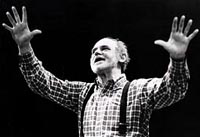
Storyteller Jay O’Callahan. (Photo: Charles Collins)
"Are you ready?"
"Yes."
"Are you frightened?"
"No."
"Oh, but I better put you to sleep."
So she opened the refrigerator. She got the Limburger cheese that smells so terrible. She put it close to the maraschino. Oh, he fainted! She cut him open, sewed him up and put him on the plate. Then, she went back, and there was only a minute and a half left. Now it was the bananas’ turn, so she lifted up the pewter tray and the bananas were stuck to the tray. She put it down, and she turned the bananas so they were on their side, and she lifted the tray and the huge bananas went rolling and rolling down, and they rolled right over the maraschinos, and they scored. Now it was one to one. She set the two teams up, and the bananas said, "Make us a wall."
"What?"
"Make us a wall."
So the bananas were one wall. Poor maraschinos were going to have to get through them. She lifted the tray. The maraschinos started down towards the wall of banana.
"Put me in."
"What?"
"Put me in."
It was the maraschino that had been operated on.
"I can't. You've been hurt."
"No, put me in!"
"All right!"
She put the brave maraschino in and the whole stadium said, "Brave, maraschino! Brave, maraschino!"
It was only seven seconds left. Six. Five. Four. Three. Two. One second. The brave maraschino jumped over the bananas and scored! Mary was so excited she jumped around and she took the seven bowls of popcorn, threw the popcorn all over the kitchen, and then she paraded!
Then she said, "Maraschinos, you deserve a prize. Bananas, you were good too. Tomorrow, you'll be banana bread but, maraschinos, you get the prize." And so she got a bowl and she filled it with vanilla ice cream, chocolate ice cream, strawberry ice cream, and then chocolate sauce. Whipped cream.
"It's for you."
"No, it's for you."
"No, no it's for you.”
“No, you're the best!"
"I suppose I am."
So Mary ate the whole Super Bowl sundae and then she looked around the stadium... popcorn everywhere. The fans hadn't cleaned up. She had to clean the whole stadium. She was tired now, and she went down to her room. She got into bed, and an hour later her dad came.
"Oh, what a game. Oh, my stomach, my stomach. Where's the AlkaSeltzer? Come on, we'll play checkers."
"No, no. I'm tired."
"Well, you better have supper."
"No, Dad, I don't need supper. Good night."
"Well, good night."
He started down the hall. He could hear Mary saying, "Brave maraschino. Brave maraschino."
CURWOOD: Jay O'Callahan. Mary and the maraschino cherry. [LAUGHS] Didn't she top the sundae with the cherries?
O'CALLAHAN: [LAUGHS] She decided that they should go back into the jar with the juice. So she missed that one part, but she looked forward to the next year when they would have another parade.
CURWOOD: I got a suspicion that Mary is really you, Jay O'Callahan. [LAUGHS] So the cherries are back in the bottle. That means there is a promise for the future?
O'CALLAHAN: Exactly. Exactly. And every day when she opens that up she smiles, seeing those red cherries.
CURWOOD: Ahhh, so there is hope, there is fun ahead for us.
O'CALLAHAN: There is lots of hope. Lots of hope. Everybody get your maraschino cherries.
CURWOOD: Jay O'Callahan is an extraordinary storyteller who joins us from time to time. Thank you so much for coming by this year.
O'CALLAHAN: And thank you, Steve. It was a delight as always.
Related link:
More about Storyteller Jay O’Callahan
A Green Message for the Next Generation
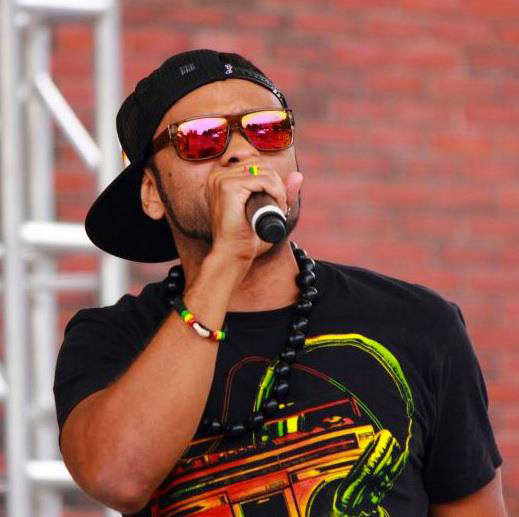
Green Energy Artist Tem Blessed rapping at the annual Connecting for Change conference in New Bedford, MA. (Photo: Connecting for Change, the Marion Institute)
[MUSIC: Tem Blessed, “Divest! 350Org”, Surreal]
CURWOOD: That's green energy hip-hop artist Tem Blessed and his band. Hip-hop might not be the sound that you associate with environmental action, but Tem is using this music to educate young people about sustainability. Recently he stopped in our studio on his way to a concert here in Boston, and I asked him first where his name “Tem Blessed” comes from.
BLESSED: Oh, man. Well, I was blessed with a long name. My first name is Temistocles. It's Greek although I'm Cape Verdean. But I always knew I was blessed to have talents. I could draw, I could write, I could sing... and a great family that led me to where I'm at today.
CURWOOD: And how did you get into, well, I don't know what to call it except maybe green hip-hop.
BLESSED: I've always been into socially conscious hip-hop. I came up during the time '92 through '96, what I call the “golden era” of hip-hop, where you had KRS1, Public Enemy, you know, all these greats... and Eric B. and Rakim, who was always teaching us something, teaching us about the world and other cultures. And so when I started doing hip-hop, being about hip-hop and this culture and this music, I wanted to be a part of that. So eventually when I went his conference called "Connecting for Change" I was just blown away. My mind got blown by all this information I was receiving about what was going on in the environment and sustainability. It was just a natural evolution to go from social justice topics to sustainable topics, which always has equity involved in that.
CURWOOD: So you have this tune, "I Am the Bee". What's this all about?
BLESSED: So "I Am the Bee" has to do with colony collapse disorder which is what's going on with the bees currently. The bees are no longer going to their hives; and as Einstein had said, "If the bees die, we die." We have only four years because they pollinate most of the things that we eat, so when I heard about this information I said, "My family needs to know about this. My community needs to know about this. The world, the planet needs to know about this.”
CURWOOD: And of course you like honey as well.
BLESSED: Oh, I love it. It's sweet. [LAUGHS]
BLESSED: (Rapping.)
I am the bee.
Pollinate the truth if you choose to see.
Pollinate the youth to truly be free.
Pollinate love, let's all agree
I am the bee.
Keystone species, we need these bees, honey.
They pollinate most the things you eat.
Funny, they do this for free, without a fee.
Billions of produce produced nationally.
Now, millions of bees have abandoned their hives.
If they disappear, in four years the human race will die.
That's a quote from the famous scientist Einstein.
It's logical to anyone with half a mind, man.
It's horrible.
Where you think where you going to run and hide?
It's possible for us to combine and stop these lies.
Respect all life wherever it resides,
whether plant, algae, bacteria or fungi.
That's right.
It's time for us to vocalize because
if the bees die, then we too die.
That's right.
It's time for us to strategize
‘cuz if the bees die then we too die.
I am the bee.
Pollinate truth if you choose to see.
Pollinate the youth to truly be free.
Pollinate love, let's all agree.
I am the bee.
CURWOOD: [LAUGHS] That's great.
BLESSED: Awesome. Thank you.
CURWOOD: So, hip-hop is not your Brahms and Benny Goodman crowd. It's for a younger set. How do young folks respond to what you’re doing?
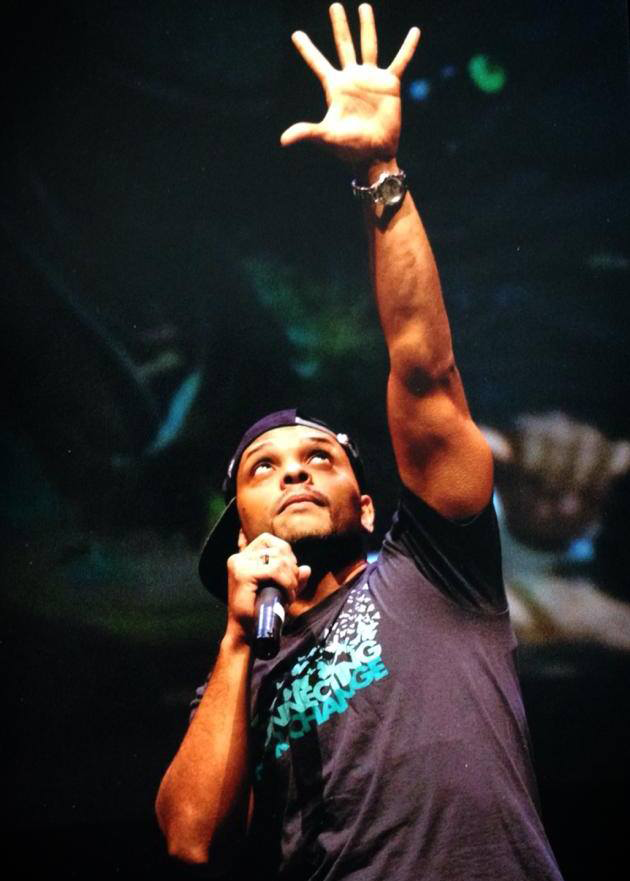
Tem Blessed leads a workshop at the annual Connecting for Change conference in New Bedford, MA. (Photo: Connecting for Change, the Marion Institute)
BLESSED: Hip-hop is the voice of the youth, and it's what really touches them, and we look to bring some of these messages through the music, using hip-hop as a tool, to educate, to inspire, to have the youth get out there and create some of their own hip-hop in a way that's constructive, energizing, and really has a focus on the future that's a positive focus.
CURWOOD: So this time of year as the days have gotten real short and the bees have tucked themselves into their hives with all that honey to make it through the winter, we think about the holidays, getting together. Now, what were some of the traditions you had in your family coming up?
BLESSED: So I'm the youngest of six. Mother and father in the home, and it was always, you know, when we used to go out anywhere, my father kind of trained us to get back together when he needed, so there was this whistle that used to come around, and he’d be like, [WHISTLES]. And if you heard that whistle you had to have to come running. And if you didn't come running you were in trouble. For whatever reason, one time at the mall my sister and I didn't hear the whistle. So we must have been playing Atari 2600, and we're just caught up, and she's maybe looking at some Barbies or something so we didn't hear the whistle. And before we know it was like, "Hey, where's our parents?" And we start lookin’ around, and my sister, you know I'm looking at her for the courage and strength, but once I've seen her kind of start crying, forget it, it was a wrap for me. I'm bawlin’, I'm cryin’. Luckily, we were able to find some security guard who did the page, and the page was nothing like the whistle. Before mom arrived, my older brother arrived. "Ooooh, you're in trouble!" When we got home, we really got it. It's a traditional way of getting Cape Verdean discipline, but it kept us in line and it was great.
CURWOOD: A whistle, huh? Maybe we could use a whistle?
BLESSED: Oh, we definitely need a whistle. I don't know if people are hearing the whistle. We have a climate crisis going on right now, and if we don't do something right now, we will not have a future. So now is the time for us to do something. Listen to the whistle. The scientists are ringing it and blowing it loud and clear. Let's do something, people.
CURWOOD: And you have a piece you call "Now Is the Time."
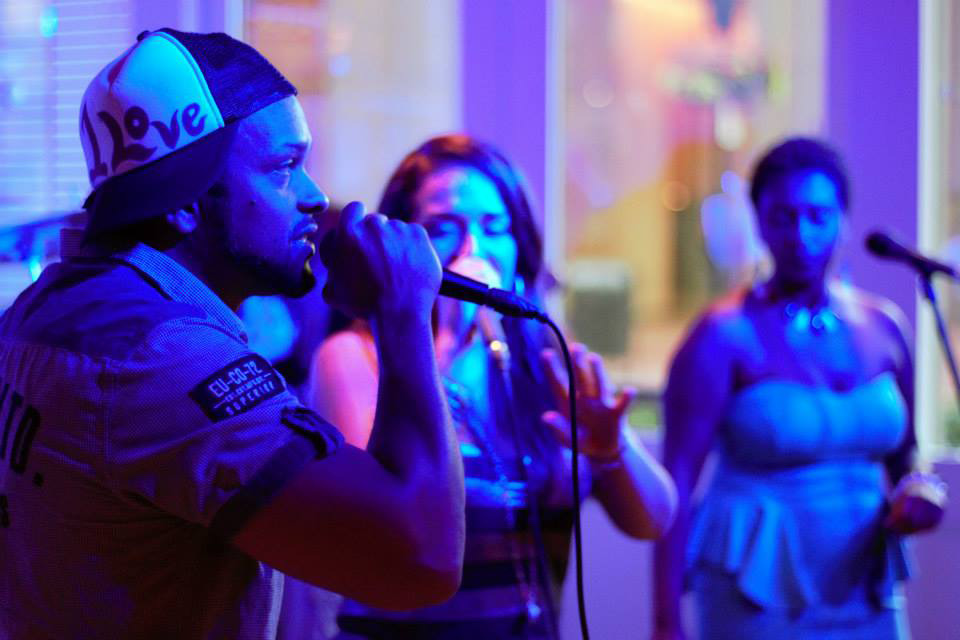
Tem Blessed and the band perform at King Street Live. (Photo: King Street Live)
BLESSED: Yes, now is the time, y'all.
(Solo rapping) Generation: now is the time.
Take action.
It's your time to shine.
Generation:
Now is the time...
(Solo rapping fades into the ensemble version.)
Yes.
This generation is going to solve the climate crisis right?
When I say "generation" I want you to say "now".
When I say "take action", I want you to say "now".
Here we go.
Generation, now.
Now is the time.
Take action, now.
Your time to shine.
Generation, now.
Now is the time.
Take action, now.
Your time to shine.
Generation, now.
Now is the time.
Take action, now.
Your time to shine.
Generation, now.
Now is the time.
Take action, now.
Your time to shine.
They say it's hard to organize around science.
I say "atmospheric chemistry", you say, "silence".
‘Cuz he's bored, she yawns,
I'm ignored. I'm gone.
You're like, "What was that for?"
Yeah, let's examine the challenge
that we've been handed.
Previous generations
have left us stranded, abandoned,
CO2's like a hot blanket
around the cold planet.
Polar ice caps melted.
Polar bears will soon vanish.
You don't care.
You're a buffoon, kid.
That's me being candid.
Honestly, smart people know it's all connected.
If you use common sense and logic
then you're bound to get it.
Hectic? Yeah, the future's getting hectic.
He's like "Dude, he's rude.
Man, I'm feeling disrespected."
Hectic. Hectic.
The future's getting hectic.
Mother Nature's the one, ah the one disrespected.
Generation, now.
Now is the time.
Take action, now.
Your time to shine.
Generation, now.
Now is the time.
Take action, now.
Your time to shine.
Generation, now.
Now is the time.
Take action, now.
Your time to shine.
Generation, now.
Now is the time.
Take action, now.
Your time to shine.
Words ain't words, just the tip of the iceberg.
Category five hurricane not a nice word.
Katrina, FEMA, climate change, Fukushima.
We can build a brighter future.
Now they label me a dreamer.
They may say that I'm a dreamer,
but I know I ain’t the only one.
I'm the golden son
so empowered with the golden tongue.
I'm hoping, Son,
we'll come together and overcome.
This climate crisis is affecting everyone.
One, two. One, two.
What we going to do?
Change the way that we livin’
because we need to.
I'm talking about changing our lifestyle.
Sounds wild.
But I guarantee that it would be worth your while.
Now, if you're wonderin’ where to begin.
Let your boy Tem Blessed
break down the top ten.
One. Two. Three. Four. Five.
Six. Seven. Eight. Nine.
It's Tem Blessed and Blessed Energy.
One: Creation. See your felt innovation. Those old light bulbs replace them.
Two: Unplug your stuff when they're not being used. Cell phones chargers are vampires, dude.
Three: Buy green, buy less, buy local, buy fresh, buy organic and, yes, buy less.
Four: Be aware what you wear. Man, you've got 14 sneakers. Do you need another pair?
Five or six: I'll throw you in the mix. I say reduce, reuse. You say “Cool.”
Seven: Get off of the water that's bottled. You ought to use reusables with filtered tap water.
Eight: To reiterate. Eat local or garden. Start it. Shop at the farmer's market.
Nine: It's about time to cut some carbon off. At least one day of the week, bike, bus or walk.
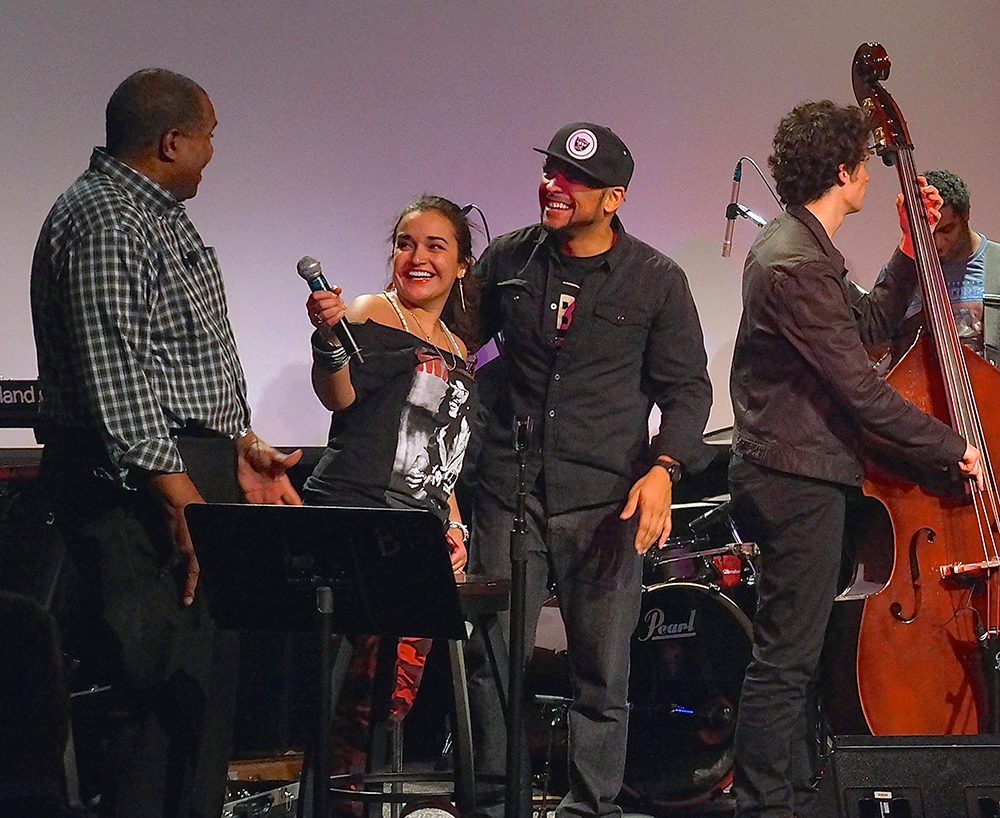
Tem Blessed and his band entertain at a fundraiser for New England Grassroots Environment Fund. Concert Emcee Steve Curwood in the background. November 2014, Berklee College of Music. (Photo: Sarah Coale, Music2Life)
Ten: Tell your family and friends. Put out the word and help them comprehend.
Generation, now.
Now is the time.
Take action, now.
Your time to shine.
Generation, now.
Now is the time.
Take action, now.
Your time to shine.
Generation, now.
Now is the time.
Take action, now.
Your time to shine.
Generation, now.
Now is the time.
Take action, now.
Your time to shine.
I thank you.
CURWOOD: Tem Blessed is a hip hop artist from New Bedford, Massachusetts. Thanks so much for taking the time.
BLESSED: You're welcome. Thank you for having me on the show.
CURWOOD: And hopefully, people are hearing that whistle.
[WHISTLING]
Related links:
- More about Green Energy Artist Tem Blessed
- The Marion Institute
[MUSIC]
CURWOOD: Many thanks to the New England Grassroots Environmental Fund and Music2Life. Coming up...a chance to laugh, sing and cry with Acadian songwriter Denny Breau.
That's just ahead on Living on Earth. Stay tuned.
[MUSIC]
CURWOOD: You can hear our program anytime on our website, or get an audio download. The address is LOE dot org. That’s LOE dot ORG. There you’ll also find pictures and more information about our stories. And we’d like to hear from you. You can reach us at comments@loe.org. Our postal address is Post Office box 990007, Boston, Massachusetts, 02199. And you can call our listener line at (800) 218-9988.
ANNOUNCER: Funding for Living on Earth comes from you our listeners, and United Technologies - combining passion for science with engineering to create solutions designed for sustainability in aerospace, building industries and food refrigeration. UTC companies such as Otis, Carrier, Pratt & Whitney and UTC Aerospace Systems are helping to move the world forward. You can learn more about United Technologies by tuning in to the Race to 9 Billion podcast, hosted by UTC’s Chief Sustainability Officer. Listen at raceto9billion.com. That’s raceto9billion.com. This is PRI, Public Radio International.
[CUTAWAY MUSIC: Maria Kalaniemi & Aldargaz, “Slingerdansin,” on Iho, Olarin Musikki]
A Mainer's Family Traditions
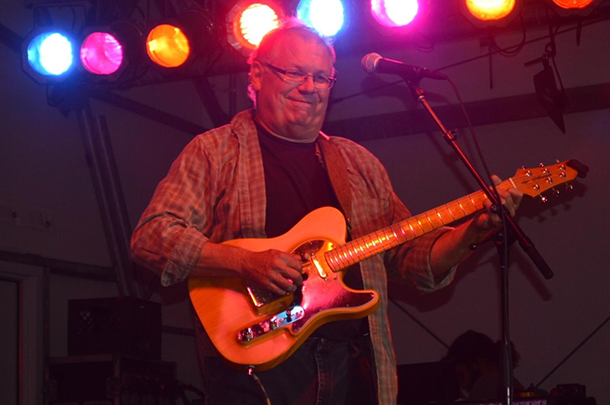
Singer/songwriter Denny Breau performing at the 2014 Fryeburg Fair in Fryeburg, Maine. (Photo: Denny Breau and family)
CURWOOD: It's the Living on Earth solstice and holiday season show. I'm Steve Curwood. We head now to the frozen north of Maine to join singer, songwriter and raconteur Denny Breau from Lewiston, Maine. So Denny, coming home for the holidays means of course getting something to eat. I’m sure you’ve got something for us along those lines.
BREAU: I sure do. It’s a song I wrote about my favorite dish in the whole world, not synonymous with holidays, but still my very best favorite.
[BREAU PERFORMS SONG “POT ROAST” ON ACOUSTIC GUITAR]
Now there’s this little thing I’ve been addicted to.
So many times, I’ve said we’re through.
But I just keep on walking right back to you.
‘Cuz one helping’s so good, I think I’ll have two.
God only knows how much I love to eat
Been simmered for hours, chuck roast meat.
Bang for the buck, just can’t be beat.
And if you’ve got anything left, you make a fricassee.
Oh, pot roast
So bovine
Pot roast
Talk about dinner on a dime.
Pot roast
With a little red wine.
Some mashed with gravy’s gonna blow your mind
I said pot roast.
For all your guests.
Pot roast, baby.
Hell, why not feed ‘em the best?
Pot roast – I’m feeling blessed.
‘Cuz if you think you’re through – I could
Finish the rest of your pot roast.
Mmm, boy that sure is good honey.
You’re not gonna throw that away, now, are you? I’ll eat that.
Makes no difference whether you’re black or white;
Protestant, Catholic, left or right;
We got this one thing in common,
You know we all love the kids and the wife but it’s that
Crock pot that’s callin’ me home tonight.
So you can keep your turkeys, your chickens and your ham
And your cranberry stuffing with those candied yams
‘cuz when that next holiday comes rollin’ round baby
for me it all comes down to pot roast
so bovine
pot roast
talkin’ about dinner on a dime
pot roast
I like mine with a little red wine
Some mashed with gravy, gonna blow your mind.
Pot roast
for all your guests
Pot roast
Why not feed ‘em the best?
Pot roast
I’m feeling blessed.
And if you think you’re through – I could
Finish the rest of your pot roast.
Mmm, baby
That sure is good, honey.
Any more gravy?
Mmm-mmm.
Who made that, anyway?
Well, I did.
Mm-mmm.
CURWOOD: Wow! That's amazing. You're making me so hungry, Denny.
BREAU: [LAUGHS] I'm getting pretty hungry myself.
CURWOOD: Yes, sounds pretty good. Now, so pot roast, that's not expensive meat at all.
BREAU: Not at all. That's the whole point.
CURWOOD: So you grew up in...?
BREAU: I grew up in Lewiston, Maine.
CURWOOD: Mainers... when you go home there's, yeah, the place where you live and then there is camp.
BREAU: Oh, yeah. Camp is a very important thing, and we’ve been going to this one particular camp for 30 years, the family and I. Every year, at the end of the summer when we start to close it up for the season, we do what they call an “I-C.”
CURWOOD: An “I-C?”
BREAU: An “I-C.” That's an "idiot check".
CURWOOD: Oh. [LAUGHS]
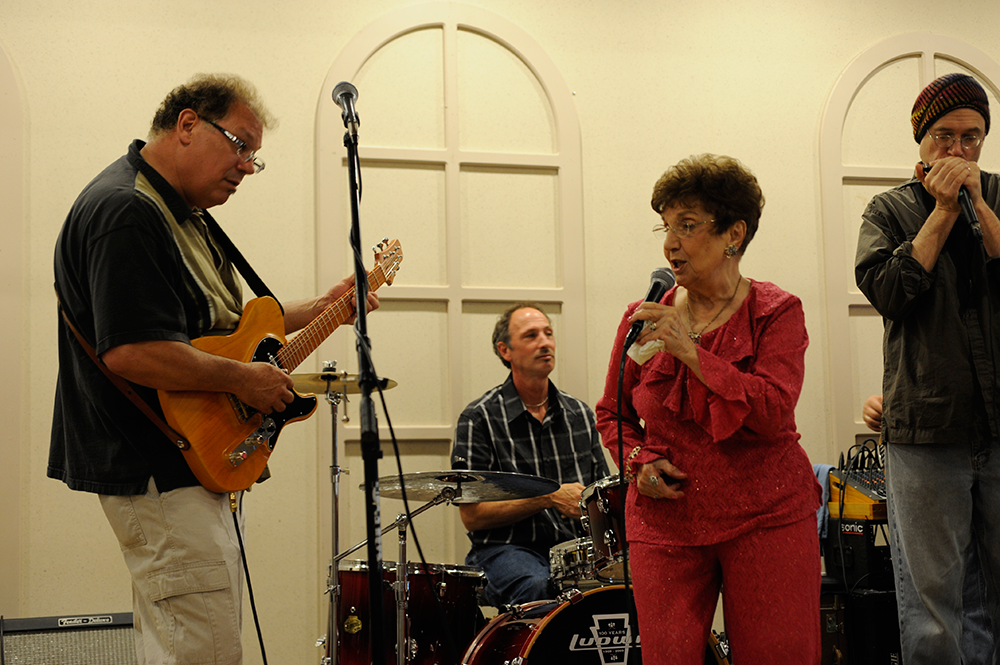
The Breau Family show, 2012. Denny’s mother, Betty Cody, toured extensively with Denny’s father Hal Lone Pine during the ‘40s and ‘50s, and she is considered a “legend in country music.” (Photo: Denny Breau and family)
BREAU: That’s what that means, yeah. You kind of go through the camp and make sure you didn't forget your sunglasses or your favorite bathing suit or your favorite CD. It could be just about anything you just don't want to leave there so you have to go back ’cuz it's a ways away. One year we forgot the dog. Yup, we left the dog there. Had to turn around go back. "I thought you had the dog." "I thought you had the dog." Well, nobody had the dog, so…
CURWOOD: Now, I imagine your camp is some place near a lake in Maine.
BREAU: Yeah, it's up in Peru, Maine, a placed called Worthley Pond.
CURWOOD: And of course, because winter is coming along, that sets you up for a great Maine tradition.
BREAU: I've never actually ice-fished myself. I've sat in the shacks and shared a few stories and a couple of glasses of this and that. You actually cook meals and just wait for a bite, and certainly around the holidays a lot of people love to get together and get ice-fishing and maybe have a nice fresh salmon along with the pot roast, ya’ know.
[BOTH LAUGH]
BREAU: So anyway, this next song is called “Ice-Fishing.” I kind of wrote it to poke fun at Mainers a little bit and their garb and the tradition itself and just all of the fun aspects of ice fishing. I hope you like it.
[BREAU PERFORMS SONG “ICE FISHING” ON ACOUSTIC GUITAR]
Now way up north where the cold wind blows
When the lakes freeze over people chop little holes
Drop a line, kick back, a little wooden shack
And if the ice didn’t melt they’d never go back
Just a little wood stove and they’re waitin’ for a bite
Gonna fish all day, drink all night
I’ll be sittin right here when the winter ends
Sittin’ right here when it comes again.
And we’ll go
Ice fishin’
Aint’ nothin’ quite the same.
Ice fishin’
It’s just a party by another name.
Well, I’ve got thirty below
Three feet of snow
But grab your stuff ‘cuz we’re still gonna go
Ice fishin’
Ain’t nothin’ quite the same
Ice fishin’
It’s tradition here in Maine.
Whew! Oh it sure is cold today, though…
I’ve got green gummy boots and they’re lined with felt
Got a bean pocket tool hangin’ off of my belt
Plenty of beer, got plenty of time
I got a hand-knitted toque, one of a kind
If you don’t like fishin’ you can still come along
‘cuz there’s plenty of fun on this frozen pond
We got stories to tell, guitar in hand
Fish swimmin’ around ready to jump in the pan
Let’s go ice fishin
Ain’t nothin’ quite the same.
Ice fishin’
It’s just a party by another name.
Well, I’ve got thirty below
Three feet of snow
So grab your stuff ‘cuz we’re still gonna go
Ice fishin’
Ain’t nothin’ quite the same
Ice fishin’
It’s tradition here in Maine.
You know, our parish priest old Father Mackenzie.
He goes ice fishin’ too.
It’s a religious experience, he’ll gladly tell you
You know he told me once he was waitin’ for hell to freeze over
So you could go ice fishin’ there too.
Let’s go ice fishin
Ain’t nothin’ quite the same.
Ice fishin’
It’s just a party by another name.
Well, I’ve got thirty below
Three feet of snow
So grab your stuff ‘cuz we’re still gonna go
Ice fishin’
Ain’t nothin’ quite the same
Ice fishin’
And I’m itchin’ to get back in the game.
Ice fishin’
It’s tradition here in Maine.
CURWOOD: So you've been a few times, but you haven't ever caught anything, huh?
BREAU: A buzz. [LAUGHS] About it. Right there. Yeah.
CURWOOD: So you describe yourself as French-Canadian, but I understand recently you had a sort of a deeper revelation about where your cultural home might be.
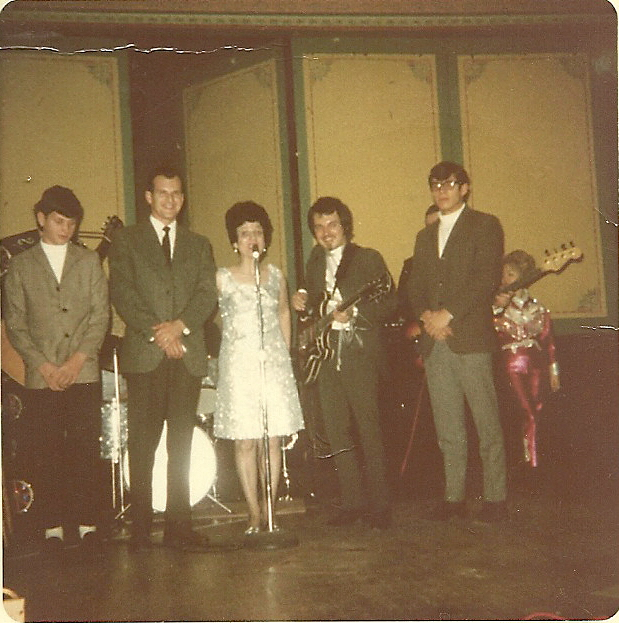
Denny Breau’s mother, Betty Cody, with her four sons: Bob, Dick, Lenny and Denny in 1962. (Photo: Denny Breau and family)
BREAU: I did. I did, as a matter of fact, I was made aware that Breau was actually an Acadian name. I just happened to be reading this article about how the Acadians had been kicked out of Canada by the English back in the 1700s sometime, and, I don't know, this song kind of fell out. The children and the mothers, they were put on ships, and they were told to just go, not knowing what the future might bring.
CURWOOD: And of course, we know Acadians in northern Maine and New Brunswick and eastern Québec, but also in Louisiana, there are Cajuns.
BREAU: Absolutely, the Cajuns, where a lot of the Acadians ended up. I thought when they left Canada that they immediately went to Louisiana and various places, but I found out that they went back to France first, and France didn't want ’em anymore so that's when they ended up coming back and settling in Louisiana. So I came by the song first and then found out I was actually related to these people down the road. A little song called “Acadie.”
[BREAU PERFORMS SONG “ACADIE” ON ACOUSTIC GUITAR, SINGING IN FRENCH MIXED WITH ENGLISH]
Pleure pas mes enfant pleure pas
Le bon dieu il y a pas oblis a vous
Je ses sait une autre journie avec du pain et du lout
Pleure pas mes enfant fait dodo
‘cross the ocean in a land far away
Once lived a man who would be king
His hunger for power would force your hand
Death and destruction he would bring
Swooped down, did his men like a hurricane
said “Leave this place or die.”
And forced upon the tall ships, and cast upon the wind
Your land we claim, it is named:
Acadie, you were my home
Now I long for the life I once knew
Deep in my heart and in my soul
Never comin’ back home to you.
How will we survive?
With nothing but the shirts on our backs.
The young without their father and they long for him at night
But he ain’t never coming back
What did we do to deserve such a fate
And why have you turned the other way?
Heaven on earth
A living hell
And I curse your name as I pray:
Acadie, you were my home
And I long for the life that I knew
Deep in my heart and in my soul
Never comin’ back
Never goin’ back
Never goin’ back home to you.
[sings in French]
CURWOOD: Oh, that's so sweet and so sad.
BREAU: Thank you. Thank you very much.
CURWOOD: At this time of year when we think about coming home for the holidays we think about some of the people who won't be there.
BREAU: Yeah, that’s very true. It's going to be a rough one this year because back in July my mom passed away. 90 years old and, uh, we'll miss her. But, ya’ know, we'll still experience the joy of being together, and certainly we'll remember Mom. She was such a big part of my life, not only as my mother, but we worked together professionally for, gosh, 30, 40 years, and it really is a tough thing to deal with. She'll be there in spirit, I'm sure.
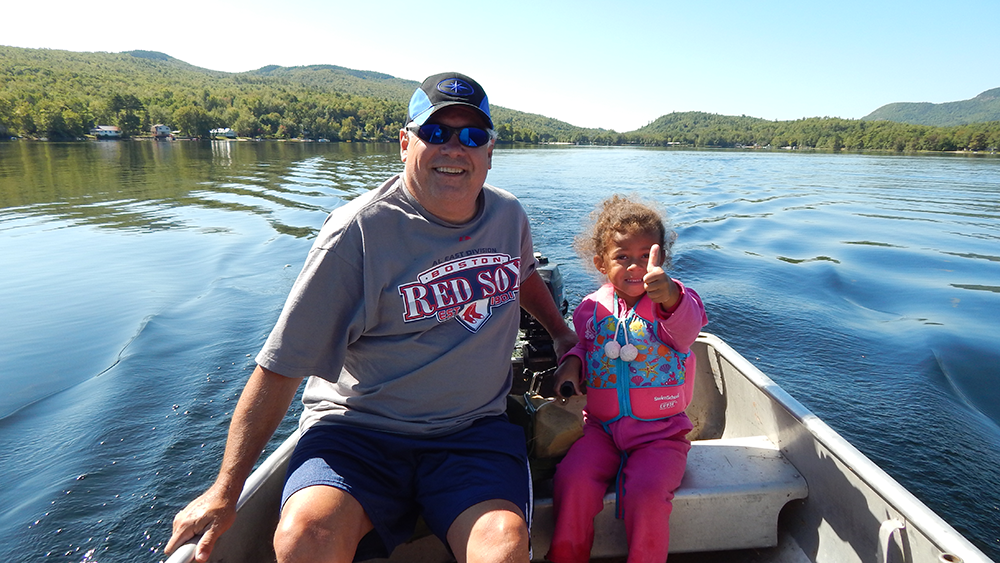
Singer/songwriter Denny Breau and granddaughter, Aiyana, on the lake at their family “camp” in Peru, Maine in the summer of 2014. Aiyana is the “daughter’s daughter” in Denny’s song by that title. (Photo: Denny Breau and family)
CURWOOD: Singing along.
BREAU: There you go.
CURWOOD: And when you gather with your family, how many of you are still singing?
BREAU: My granddaughter is very, very, very musical, loves to sing. One of the first things I wanted to do when she was born was write a song for my first granddaughter. Out at the camp again, walking around, guitar over my shoulder, just walking through the camp by myself, staring out at the lake, trying to come up with that first line, and then I happened to stumble on, “When I'm holding my daughter's daughter.” And I thought, “Oh, man, that's the line I've been looking for, and the rest of it fell out. For all you grandparents out there, love your grandkids.
[BREAU PERFORMS SONG “MY DAUGHTER’S DAUGHTER” ON ACOUSTIC GUITAR]
When I’m holding my daughter’s daughter
I feel just like a king
Hope she likes the pretty things that I bought her
And she likes it when I sing
And I know she’ll be no stranger to the water
Just jump right in
And I know I’m ready for the joy that she will bring
You and me
Here we go again
When I’m holding my daughter’s daughter
The world’s a better place
I see peace, love, innocence
On her tiny face
She’s a new day sun, shining from above
In a tropical dream
Wake up, wake up my little angel
Aiyana serene
She’s a precious little jewel
To be taken to the heart
And may she grow up to be strong and proud
May she waltz through all of life’s changes
And when she sings,
Sing it loud.
When I’m holding my daughter’s daughter
Chills run up my spine.
I wish your mother and our fathers could have seen her
Taken before their time.
But she’s a new day sun and she’s shining from above
In a tropical dream.
Wake up, wake up my little angel
Aiyana Serene
When I’m holding my daughter’s daughter
I feel just like a king
When I’m holding my daughter’s daughter
Don’t need a thing
When I’m holding my daughter’s daughter
When I’m holding my daughter’s daughter
CURWOOD: Well, Denny, you got me all choked up there.
BREAU: [LAUGHS] Me too. [LAUGHS] Me too.
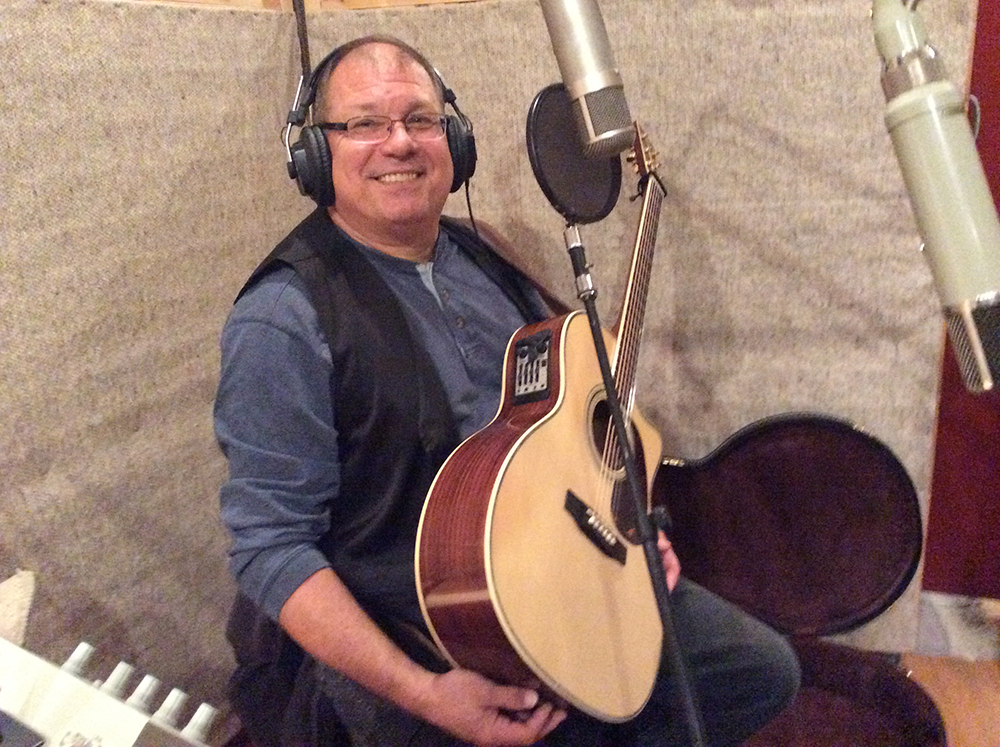
Singer/songwriter Denny Breau recording in the studio for the Living on Earth broadcast. (Photo: Steve Curwood)
CURWOOD: And one would hope that our home that we share, this Earth, will be great for your daughter's daughter. Denny Breau is a songwriter, musician, storyteller, and Maine-uh. Did I say that right?
BREAU: Pretty darn good. Maine-uh. Yessuh. It's “lobstuh” ya’ gotta say.
CURWOOD: Lobstuh.
[MUSIC]
BREAU: [LAUGHS] There you go. Lobstuh.
Related link:
More about singer/songwriter Denny Breau
CURWOOD: Living on Earth is produced by the World Media Foundation. Our crew from today includes Naomi Arenberg, Lauren Hinkel, and James Curwood. I'm Steve Curwood.
Thanks for listening.
ANNOUNCER1: Funding for Living on Earth comes from you, our listeners, and from the University of Massachusetts, Boston, in association with its School for the Environment, developing the next generation of environmental leaders. And from the Grantham Foundation for the protection of the environment, supporting strategic communications and collaboration in solving the world’s most pressing environmental problems. Support also comes from the Energy Foundation, serving the public interest by helping to build a strong, clean, energy economy, from Carl and Judy Ferenbach of Boston, Massachusetts and from SolarCity, America’s solar power provider. SolarCity is dedicated to revolutionizing the way energy is delivered by giving customers a renewable alternative to fossil fuels. Information at 888-997-1703. That’s 888-997-1703.
ANNOUNCER 2: This is PRI, Public Radio International.
Living on Earth wants to hear from you!
Living on Earth
62 Calef Highway, Suite 212
Lee, NH 03861
Telephone: 617-287-4121
E-mail: comments@loe.org
Newsletter [Click here]
Donate to Living on Earth!
Living on Earth is an independent media program and relies entirely on contributions from listeners and institutions supporting public service. Please donate now to preserve an independent environmental voice.
NewsletterLiving on Earth offers a weekly delivery of the show's rundown to your mailbox. Sign up for our newsletter today!
 Sailors For The Sea: Be the change you want to sea.
Sailors For The Sea: Be the change you want to sea.
 The Grantham Foundation for the Protection of the Environment: Committed to protecting and improving the health of the global environment.
The Grantham Foundation for the Protection of the Environment: Committed to protecting and improving the health of the global environment.
 Contribute to Living on Earth and receive, as our gift to you, an archival print of one of Mark Seth Lender's extraordinary wildlife photographs. Follow the link to see Mark's current collection of photographs.
Contribute to Living on Earth and receive, as our gift to you, an archival print of one of Mark Seth Lender's extraordinary wildlife photographs. Follow the link to see Mark's current collection of photographs.
 Buy a signed copy of Mark Seth Lender's book Smeagull the Seagull & support Living on Earth
Buy a signed copy of Mark Seth Lender's book Smeagull the Seagull & support Living on Earth

